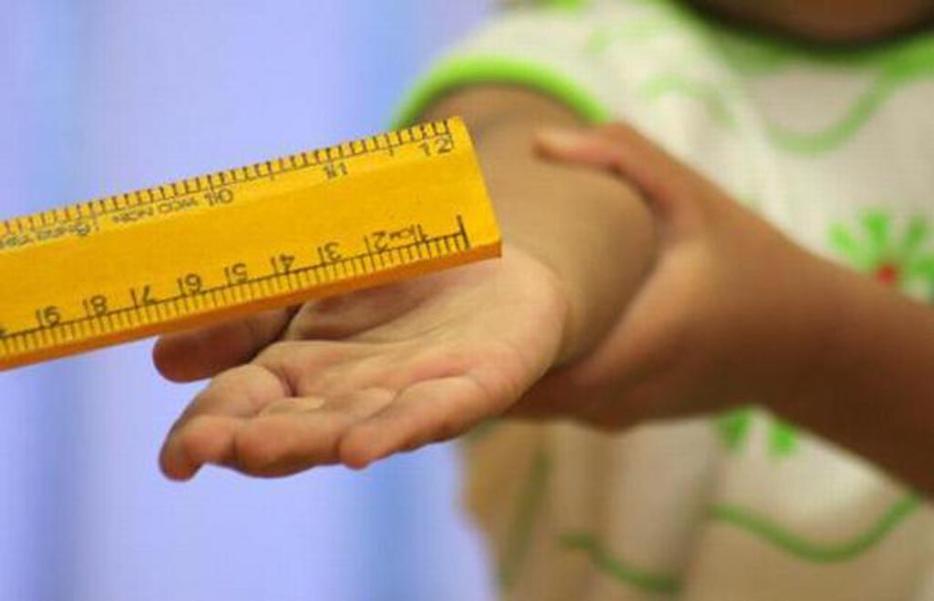The wooden spoon came down on my back with a sharp smack. It stung, but what I remember most is the smell. Soaked into the wood were the countless bowls of chicken curry and jasmine rice it has been used to stir. I was five, and my mother was punishing me for disorganizing the meticulously kept Tupperware drawer in our kitchen. I hunched over and waited for her to finish. When she put the spoon back on the counter, I shuffled to my room, a little bashful, and forced my Barbie to marry my brother’s Skeletor action figure.
In our home, there were rarely any time outs, no soap bars in our mouths. The one time my parents tried to ground us, they forgot to bar me from using the computer or seeing my friends. Instead, our parents relied on the time-tested technique of literally beating the sense into their kids. It was never done with malice: mere minutes after dragging me to my room by my ear, my mother would holler from the kitchen, asking whether I wanted an ice cream bar or a cookie for dessert.
The physical and mental effects of physical punishment on children have been studied for decades. In July, the American Academy of Pediatrics released a study showing a link between physical punishment and mental health issues like depression, anxiety, and drug abuse. In September, the Canadian Medical Association Journal urged parents and lawmakers to put an end to spanking—an act that is still legal in Canada so long as the guardian or teacher doesn’t exercise excessive force. Dr. Alan Kazdin, professor of psychology and child psychiatry at Yale University, says that being hit as a child affects children on a biological level. “It changes their immune system in permanent ways,” he says. Children who are punished physically have a tougher time fighting inflammation and can’t fend off bacteria as well as those who weren’t hit. “This means that when these children grow up, they die at a younger age from things like cancer, heart disease, and chronic respiratory disease.”
These studies rarely account for the variable of culture, however, which helps determine the feelings children attach to the experience of being hit by a caregiver. A 2006 study found that corporal punishment was acceptable in 41 schools across four states in India, the most common forms being hitting with hands, or pulling hair and ears. The World Studies of Abuse in the Family Environment, a project involving research from six countries on family violence, recorded “moderate” discipline by mothers of children under 18 in India from 1998 to 2003. The rates ranged from 63 per cent in urban communities to 89 per cent in more rural areas. In the South Asian home I was raised in, hitting your kid was just how you did things.
All of my Chinese and South Asian friends report having some experience with being hit, either by a family member, a teacher, or someone in a position of power: a strict teacher in India from before their family emigrated, or a harsh piano teacher in British Columbia who demanded excellence. While all said they’d never repeat the technique on their own kids (according to Dr. Kazdin, only 30 per cent of kids who’ve been hit end up doing the same), they mostly shrug off the experience. My white friends, however, hear stories about my highly physical upbringing with shock. They handle me with kid gloves, worried that the slightest provocation will make me burst into tears, or cry “Why, mother, why?!” over lunch.
My brother thinks virtually nothing of it. “I was too busy stressing about school,” he says, to have thought much about the hitting. Unsurprisingly, my brother only remembers being hit for poor grades. I remember him as nothing less than an honour-roll student. He’s a parent now, to a toddler—a fussy, bratty, mouthy little girl as most toddlers are at two and a half. When I asked him if he’d use physical punishment on her, he replied, without question, in the negative. But whether he realizes it or not, he was an aggressive teen—no one, not even our parents, scared me more than he did. It wasn’t until his daughter was born that he calmed down, almost to the point of unrecognizability.
I call my parents every day, but I never broached the subject of punishment until a few months ago. The conversation began matter-of-factly: “I didn’t hit you that often,” my mother recalled. She remembered the wooden spoon once or twice. The slipper. Her hand. And I started to cry, like my friends had predicted, in that gaudy, loud way, because I remembered hair pulling, shoving, her nails in my skin, memories I had forgotten or suppressed. I remembered the sound of her bangles clacking together—what I’d hear as she ran up the stairs to confront me when I had done something wrong—and how I couldn’t wear them until my 20s because of those associations.
I remembered alerting a teacher when I was eight, who made a CPS call. I remember feeling guilty when I was carted off to the school psychologist’s office for two hours, and feeling worse when I found out that social workers had showed up at our home. I remember my parents picking me up that afternoon, my dad asking why I would make things up while my mom slammed her head against the passenger window. For years afterward, they referred to the incident, jokingly, as the time “when you made up that story.”
“I didn’t know you were holding this for so long,” my mother said in a near-whisper. “I don’t know this hurt you so much.” Frankly, I didn’t either. I always thought being hit had made me tough, which is something I value—something I believed was just a part of our culture.
“My mom used to pull my braids sometimes,” she said. “She used to hit me sometimes and yell at me if I did badly in school.” For her, it was routine. My dad never physically punished me—my mom handled the child-rearing—but he laughs off the subject and tells a story about his underachieving cousin, whose brother hit him for doing poorly in school, once striking him so hard that he lost his hearing. My dad recounts the tale like a charming fable from his childhood, akin to that time he went to the beach with his sister, or found a body on the train tracks with his pals. His cousin’s grades didn’t improve.
“I know it didn’t help you,” my mother told me. “It was really about my frustration.” And as much as I’d like to blame her for it, I can’t. I don’t know if I would have more patience in the same situation: as an immigrant with a working husband, a grown son, and a daughter had late in life who keeps pressing her face against all the glass surfaces I just cleaned.
Though my brother may feel confident that he’ll never lay a hand on his daughter, I’m less certain. I was a bullying, pushy, feisty kid who got suspended for fighting in my first week of junior high. Like my mother, I’m quick-tempered and hotheaded. I forget my own strength, shove friends too hard without realizing, grab my cat with unmitigated force.
The research suggests that, regardless of culture, being hit by a guardian affects children’s health. I’m far more concerned about the intangible consequences, the ones that can’t be measured: the queasy feeling of resentment that lingers long after your parents strike you, the change you go through after someone hits you for just not being good enough, and the tendency to express anger through shoving and shaking, to someone who will react similarly.
Culture can confuse you into thinking physical punishment is acceptable. It has left me with probably as much guilt as my mother—I hate that she was hurt, I hate that she hurt me, and I hate that she thinks she did me wrong. I want to spare her the guilt because I still don’t think it was her fault.
The last time my mother hit me, I was 16. It was the first time I fought back, pinning her against the couch to show her how much stronger than her I was. She stared up at me, brow furrowed, lips curled in a sneer, speechless and scared for the first time in my life. My father, who was watching, screamed: “Why do you need to fight? Why can’t you just talk to each other?”
I didn’t know how to explain it to him then, but I think it was the only thing we knew how to do.





